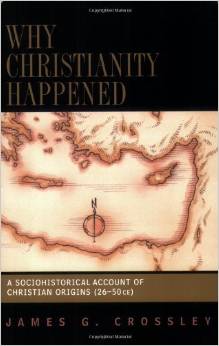 James Crossley is to be highly commended for attempting in Why Christianity Happened: A Sociohistorical Account of Christian Origins (26-50 CE) to adapt to the study of Christian origins approaches taken directly from history departments. The task of explaining how Christianity began has generally been the preserve of theologians many of whom (according to scholars like Scot McKnight, Beth Sheppard and Crossley himself)have not been familiar with methods used by professional historians outside the field of biblical studies. Crossley testifies from his personal experience that these methods are not always welcome among his colleagues and he prefaces his book with “predictable hostility” that has come his way as a consequence of his work.
James Crossley is to be highly commended for attempting in Why Christianity Happened: A Sociohistorical Account of Christian Origins (26-50 CE) to adapt to the study of Christian origins approaches taken directly from history departments. The task of explaining how Christianity began has generally been the preserve of theologians many of whom (according to scholars like Scot McKnight, Beth Sheppard and Crossley himself)have not been familiar with methods used by professional historians outside the field of biblical studies. Crossley testifies from his personal experience that these methods are not always welcome among his colleagues and he prefaces his book with “predictable hostility” that has come his way as a consequence of his work.
Now I like to back the underdog and anyone who attempts to displace a “faith-based discipline” with secularist methods so I was eager to read Crossley’s book. Moreover, Chris Keith, a prominent advocate of a “(social) memory theory” approach to the historical Jesus, has praised Crossley’s work as
some of the most interesting . . . in the field right now, some of which, really, no one else is doing. (James Crossley Joins the Criteria of Authenticity Skeptics)
As I proceeded, though, questions arose and I came to wonder if what Crossley was doing was building a magnificent edifice upon a foundation of sand. So in this post I will address what I see as the strengths and weaknesses of Crossley’s approach as he himself explains it in his Introduction and opening chapter, “Toward a Secular Approach to Christian Origins: The Use of the Social Sciences in New Testament Scholarship”. (I have addressed other aspects from the main body of Crossley’s work before and I will not revisit those here.)
Before starting: The Question
Crossley provides the contextual framework for his book in his Introduction. His argument is set within the basic framework of the traditional Acts-Eusebian model of Christian origins. As I understand it this model means the following: Continue reading “Why Christianity Happened — Toward a Secular Approach to Christian Origins”
